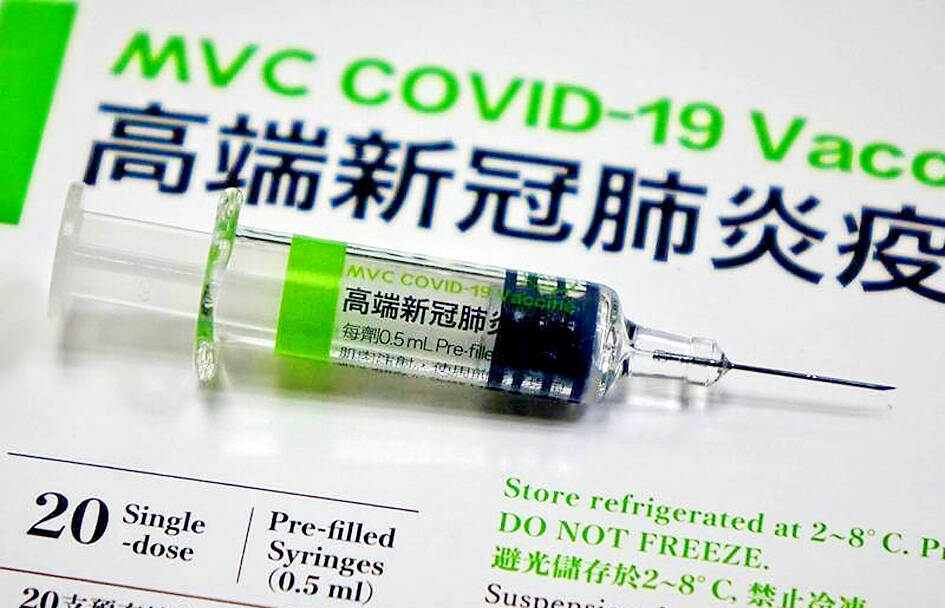Taiwan’s indigenously developed Medigen COVID-19 vaccine is as effective in preventing deaths and serious symptoms as mRNA shots, a study to be published in the US Centers for Disease Control and Prevention’s journal next month showed.
An early release of the study is available on the Web site of the Emerging Infectious Diseases journal.
The study, conducted by the Centers for Disease and Control (CDC), utilized data from Taiwan’s records of inoculations, hospitalizations and deaths since the local outbreak of the Omicron variant of SARS-CoV-2 in 2022.

Photo: Taipei Times
CDC Deputy Director-General Philip Lo (羅一鈞) said that the protein subunit-based Medigen vaccine had an effectiveness of 91 percent after three jabs.
The mRNA-based BioNTech and Moderna vaccines were 95.8 and 81 percent effective after three jabs respectively, while the viral vector-based AstraZeneca vaccine was 65.7 percent effective, Lo said.
The CDC study also found that Medigen and mRNA jabs had a longer efficacy period than the AstraZeneca vaccine, he said.
The research is the world’s first big data study on the efficacy of mRNA, protein-subunit and viral-vector COVID-19 vaccines that draw from real-world outcomes, he said, adding that the findings might boost the development of new protein-subunit vaccines, including Novavax.
The study vindicates the Medigen vaccine, which was unfairly criticized in the nation, Premier Chen Chien-jen (陳建仁) told an event marking the inking of a strategic alliance between Taiwan Bio-Manufacturing Corp (台灣生物醫藥製造) and US-based National Resilience Inc.
Taiwan handled its local outbreak with a conventional strategy, which proved successful in containing the virus’ spread and protecting economic growth, he said, adding that the nation has received international accolades for its accomplishment.
The COVID-19 pandemic showed that having pharmaceutical research capability without an industrial base to manufacture medicines at scale would not be enough to meet Taiwan’s needs, National Development Council Minister Kung Ming-hsin (龔明鑫) said.
The ability to mass produce medical drugs is crucial to public health as well as national security, but the nation’s NT$1 trillion (US$32.01 billion) biomedical industry has an undersized NT$700 billion to NT$800 billion manufacturing sector, he said.
Separately yesterday, Lo said that the CDC had delivered the last 156,000 Novavax XBB doses in its inventory to local governments.
The number of available Moderna and Novavax XBB vaccine doses stood at 459.2 million and 315,000 respectively, he said.
COVID-19 continues to circulate, with 52 percent of cases now being the JN.1 variant, Lo said, adding that XBB vaccines are about 50 percent effective against mild symptoms in adults.
The CDC urged the public to get inoculated ahead of the Lunar New Year holiday, which begins next week.
People older than 12 can get either type of the XXB vaccine, while children under that age can only receive Moderna’s version, it said.
Information about vaccination locations can be found online at: https://gov.tw/eU4.
Additional reporting by CNA

The Ministry of the Interior (MOI) is to tighten rules for candidates running for public office, requiring them to declare that they do not hold a Chinese household registration or passport, and that they possess no other foreign citizenship. The requirement was set out in a draft amendment to the Enforcement Rules of the Public Officials Election and Recall Act (公職人員選舉罷免法 ) released by the ministry on Thursday. Under the proposal, candidates would need to make the declaration when submitting their registration forms, which would be published in the official election bulletin. The move follows the removal of several elected officials who were

The Republic of China (ROC) is celebrating its 114th Double Ten National Day today, featuring military parades and a variety of performances and speeches in front of the Presidential Office in Taipei. The Taiwan Taiko Association opened the celebrations with a 100-drummer performance, including young percussionists. As per tradition, an air force Mirage 2000 fighter jet flew over the Presidential Office as a part of the performance. The Honor Guards of the ROC and its marching band also heralded in a military parade. Students from Taichung's Shin Min High School then followed with a colorful performance using floral imagery to represent Taiwan's alternate name

FOUR DESIGNATED AREAS: Notices were issued for live-fire exercises in waters south and northwest of Penghu, northeast of Keelung and west of Kaohsiung, they said The military is planning three major annual exercises across the army, navy and air force this month, with the navy’s “Hai Chiang” (海強, “Sea Strong”) drills running from today through Thursday, the Ministry of National Defense said yesterday. The Hai Chiang exercise, which is to take place in waters surrounding Taiwan, would feature P-3C Orion maritime patrol aircraft and S-70C anti-submarine helicopters, the ministry said, adding that the drills aim to bolster the nation’s offshore defensive capabilities. China has intensified military and psychological pressure against Taiwan, repeatedly sending warplanes and vessels into areas near the nation’s air defense identification zone and across

A Chinese takeover of Taiwan would severely threaten the national security of the US, Japan, the Philippines and other nations, while global economic losses could reach US$10 trillion, National Security Council Deputy Secretary-General Lin Fei-fan (林飛帆) wrote in an article published yesterday in Foreign Affairs. “The future of Taiwan is not merely a regional concern; it is a test of whether the international order can withstand the pressure of authoritarian expansionism,” Lin wrote in the article titled “Taiwan’s Plan for Peace Through Strength — How Investments in Resilience Can Deter Beijing.” Chinese President Xi Jinping’s (習近平) intent to take Taiwan by force